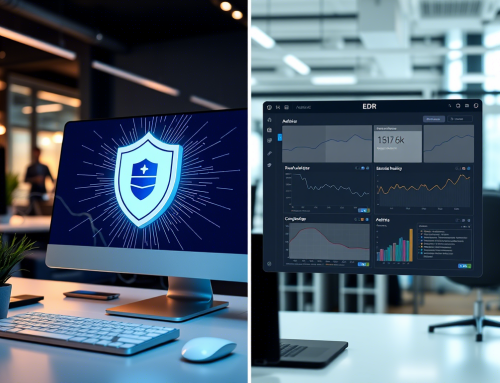Are you intrigued by the dynamic world of cybersecurity but unsure how to take the first step? A successful career in cybersecurity begins with mastering the fundamentals of IT. Understanding the essential concepts of hardware, software, networking, applications, and basic security practices not only lays a strong foundation but also equips you to tackle real-world challenges with confidence.
This guide will walk you through why IT knowledge is indispensable for cybersecurity, the core areas you need to focus on, how to acquire these skills, and the exciting career paths you can pursue in this field.
Why IT Fundamentals Matter for Cybersecurity
Before you can secure technology, you need to understand how it works. IT fundamentals give you the essential skills to configure and troubleshoot hardware, grasp how networking facilitates communication, identify vulnerabilities in systems and applications, and comprehend core cybersecurity principles.
Think of IT knowledge as the stepping stone to your cybersecurity career. For instance, without a solid understanding of how a Layer 2 switch operates, implementing port security on that switch would be nearly impossible. Similarly, familiarity with operating systems like Windows or Linux is crucial for effectively deploying advanced tools and processes in the future.
Understanding IT gives you the power to analyze and resolve technical issues, secure systems proactively, and build innovative solutions to protect sensitive information.
The Five Core Categories of IT Fundamentals
To build a strong IT foundation, focus on mastering these five categories. Each one plays a critical role in shaping your cybersecurity expertise.
1. Hardware
Learn the physical components of computers, such as processors, memory, and storage. Knowing how hardware works enables you to identify and resolve potential issues like faulty wiring or overheating. Mastering hardware configuration also sets the stage for securing physical devices against unauthorized access.
2. Software
Explore the world of operating systems and applications. Understand the basics of programs like word processors, browser clients, and operating systems such as Windows, macOS, and Linux. Gaining this knowledge allows you to analyze how software functions, which is vital for identifying vulnerabilities or misconfiguration.
misconfiguration3. Networking
Networking is the backbone of modern communication, making it a critical area to understand. Learn how devices connect, share resources, and transfer data across networks. Concepts like IP addresses, protocols, and network topologies are key to identifying potential points of failure or attack.
4. Applications
Applications are the tools we use daily to accomplish specific tasks. From email clients to customer relationship management (CRM) software, understanding how applications interact with operating systems and hardware is crucial to ensuring their security and performance.
5. Security Basics
No system is entirely free of risk. Security fundamentals teach you to recognize vulnerabilities, assess risks, and implement proactive defenses. Gain insight into best practices for password management, encryption, and patch updates to minimize threats.
These building blocks ensure that you have a comprehensive understanding of technology before advancing into more complex cybersecurity concepts.
Essential Skills to Acquire
Aspiring cybersecurity professionals should focus on acquiring specific IT skills that directly apply to real-world challenges. Here are a few necessary skills to get you started:
- Hardware Configuration: Assemble and troubleshoot computer systems to fully understand their physical components.
- Operating System Management: Learn how to install, configure, and maintain OS environments like Windows and Linux.
- Network Troubleshooting: Gain practical knowledge in diagnosing and resolving connectivity issues.
- Threat Identification: Learn how to spot and mitigate security threats, such as malware or phishing attempts.
- Ethical Hacking: Understand the basics of offensive security measures, such as penetration testing, in a controlled and ethical environment.
These skills not only make you well-rounded but also prepare you to specialize in areas like digital forensics or penetration testing.
How to Learn IT Fundamentals
Fortunately, there’s a wealth of resources to help you learn IT fundamentals and cybersecurity basics. Whether you prefer structured courses or hands-on practice, there’s something for everyone.
Online Platforms
- FreeCodeCamp offers free, beginner-friendly lessons on IT basics.
- Udemy has courses like Complete Introduction to Cybersecurity by Grant Collins, which covers IT and cybersecurity fundamentals for beginners.
- YouTube provides in-depth tutorials from trusted sources like Google and online tech communities.
Certification Programs
Certifications validate your knowledge and show employers that you’re serious about your career. Consider starting with foundational credentials like CompTIA IT Fundamentals (ITF+) or Cisco’s CCNA certification.
Community Engagement
Join online communities, attend webinars, and participate in live Q&A sessions. Groups like Cybercademy provide career advice, security projects, and support networks for professionals and students.
Hands-On Practice
Set up virtual environments, like Kali Linux virtual machines, to experiment safely. Test tools and configurations to gain real-world experience.
Practical projects not only enhance your technical skills but also build confidence as you apply theoretical knowledge to solve problems.
Cybersecurity Career Paths
Once you’ve mastered the basics, you’ll be ready to explore specialized roles within cybersecurity. Here are some popular career paths to consider:
Security Analyst
- Responsibilities: Monitor and analyze security threats, respond to incidents, and implement security measures.
- Skills Needed: Incident response, threat analysis, and knowledge of SIEM tools.
Network Engineer
- Responsibilities: Design, implement, and maintain secure network architectures.
- Skills Needed: Networking protocols, firewall configuration, and VPN setup.
Cybersecurity Consultant
- Responsibilities: Assess organizational security risks, provide recommendations, and develop strategies to safeguard systems.
- Skills Needed: Risk assessment, policy development, and regulatory compliance knowledge.
Each role offers unique challenges and opportunities, allowing you to make a meaningful impact by defending businesses against cyber threats.
Start Building Your Cybersecurity Knowledge
Cybersecurity is an exciting and rewarding field, but clear foundational knowledge is essential for success. Understanding IT fundamentals equips you with the skills and confidence needed to tackle advanced cybersecurity concepts down the line.
Begin your educational journey today with resources that fit your learning style. Whether through online courses, practice projects, or community interactions, consistent learning and hands-on experience will prepare you to thrive in your cybersecurity career.





